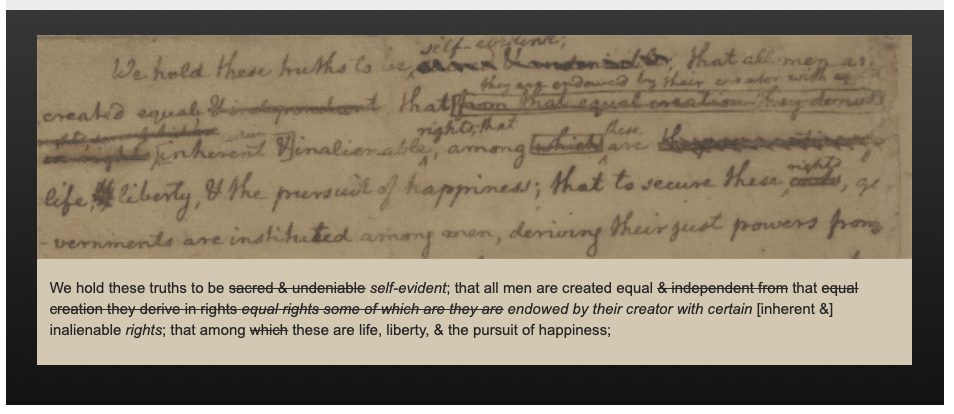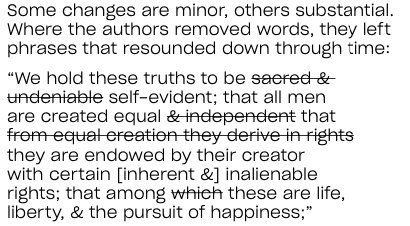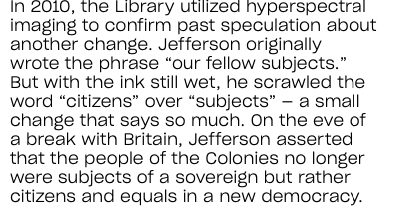
A Look Inside the Process of Writing and Editing the Declaration of Independence and Thoughts on the Pursuit of Happiness
The July/August 2022 issue of the Library of Congress (LOC) magazine is chock full of fascinating articles and images about items in its collection, but the article Creating the United States made me want to write this blog post. The article talks about the writing and editing process behind the United States Declaration of Independence.
Thomas Jefferson wrote the initial draft in less than 17 days (!) in the summer of 1776. During that time, he made some changes. Other men, including Benjamin Franklin and John Adams, part of a Committee of Five entrusted with the task of creating a final draft, made yet more changes.
The Committee presented their final draft to the members of the Second Continental Congress on June 28, 2022. On July 4, 1776, after debate and a few other changes, the Second Continental Congress adopted the final version.
The LOC interactive online exhibit related to the article shows the four handwritten pages written in Jefferson’s tidy cursive script and the changes and additions he and others made.
The Nature and Type of Edits
Anyone who has ever had to write an important document, be it an essay, dissertation, or a work of fiction, knows how difficult first drafts are to get done and how daunting self-editing can be. Any writing professional who edits other people’s work understands how difficult the review/editing can be.
Tempers can flare, and heated debate is often part of the process. Imagine the discussions during process of writing and editing something as important as a public declaration of the intent to separate from the most powerful ruler and nation on earth! Then imagine a group of five doing it all in less than three weeks during a hot summer in Philadelphia!
Some of the edits they made were simple and clearly done to tightened the draft. Of particular interest to me is the second edit. “Equal” and “independent” are appropriate and fit for purpose, yet the goal was to eliminate unnecessary words. So, removing one was an easy editing decision.
The second edit must have been harder to make, but I am glad they made it. The phrase “from equal creation they derive in rights” is awkward even for that time period and smacks of legalize even today. Given many important political documents back then were read aloud in pubs and other public spaces, it was important to remove anything that would distract during a public reading.
That phrase was redundant and stilted. So, it had to go. Then, perhaps, Jefferson and his editors read the paragraph aloud and removed “& independent.” The resulting paragraph is powerful and memorable.

The edit (seen below) is an example of how good a writer Jefferson was and indicates his understanding of the power a single word can have. Jefferson had initially written the phrase “our fellow subjects,” an understandable choice given the American colonies were still under British rule at the time. But, he quickly changed the word “citizens” to “subjects.”

The Pursuit of Happiness: an Inalienable and Natural Right
And now we come to a part of the article I found most fascinating from an historical and a current events point of view: how, and possibly why, Jefferson chose the phrase “pursuit of happiness” for what is arguably the most important set of sentences in the entire document.
“We hold these truths to be self-evident, that all men are created equal, that they are endowed by their Creator with certain unalienable Rights, that among these are Life, Liberty and the pursuit of Happiness.”
From the Declaration of Independence, signed July 4, 1776 in Philadelphia, Pennsylvania
I have often wondered about Jefferson’s choice of these three particular rights for inclusion in this Declaration. There are other important human rights, so why choose these three and only three?
Two of the rights Jefferson chose are binary states: life (you are either alive or dead) and liberty (you are either in jail or not). If someone kills you, you lose the right of life. If someone puts you in jail, you lose the right of liberty. But, for the third, he did not use a single word, the word “happiness.” He modified the noun by saying the “pursuit of happiness.”
The LOC article revealed something totally surprising to me: Jefferson had first written “Life, Liberty, and Property.” Then, he changed the word “Property” to the phase “pursuit of Happiness.”
That surprise generated so many more questions for me! Did he mean the journey and not the destination was important? Where did he get this concept of happiness? What did he think happiness is? Why did he think the pursuit of happiness was a right important enough to put in the Declaration of Independence?
The LOC interactive exhibit provides a small clue. It says, “When Thomas Jefferson asserted the inalienable rights of life, liberty, and the pursuit of happiness in the Declaration of Independence, he was influenced by the writings of Henry Home, Lord Kames (1696–1782). Kames was a Scottish moral philosopher who argued for the right to ‘the pursuit of happiness’ in his acclaimed work Essays on the Principles of Morality and Natural Religion.” Jefferson owned and annotated a copy of the work, so historians know he must have not only read the book but studied it and considered carefully the thoughts within.
Having thought about this, to me, Jefferson is saying, in 1776, every American had the right to decide for themselves what will make their lives better and not be under the thumb of some old, rich, out-of-touch White guy living thousands of miles away. And, here, today, in the United States of America, this assertion is still a vitally important concept.
Think of happiness as not a sort of bubbly feeling of bliss or a bouncy tune. Think of happiness as Jefferson did: a sense of satisfaction derived from intentional and deliberation actions you take to make your life better. You get to decide what “better” is. No one else has the right to define “better” for you. “Better” is your personal choice.
Jefferson thought about all this and realized how much more important and fundamental the right to pursue happiness is than the right to own, say, property. After all, property can be destroyed or stolen, but new property can be acquired.
Without the right, though, to pursue one’s own destiny unhampered, what good is any other right? Each of us has the fundamental, inalienable right to make our own decisions about our lives and bodies.
There always have been, and will always be, despots, tyrants, and others hell-bent on restricting and destroying rights. Back in 1776, the Committee of Five and the Second Continental Congress knew they were up against the most powerful absolute ruler in the world: the King of England. His word was, literally, law. Somehow, though, this small group of men mustered enough courage to join together, stand up to tyranny, and fight for their liberty, their future, and ours.
Any politician or public figure today and in the future who disputes the right to the Pursuit of Happiness as Jefferson understood it does not care about human rights. They care only about power and control. And, as Jefferson, Franklin, and all the other members of that Congress long ago understood so well, when tyrants succeed in destroying one right, they will not stop until they has destroyed them all.
People of the United States, please remember your human right to self-determination when you vote in the mid-terms, and, indeed, every time you vote. You, and you alone, have the right to determine your pursuit of happiness.
Your vote is your voice. Use it to speak up for your rights and the rights of others.